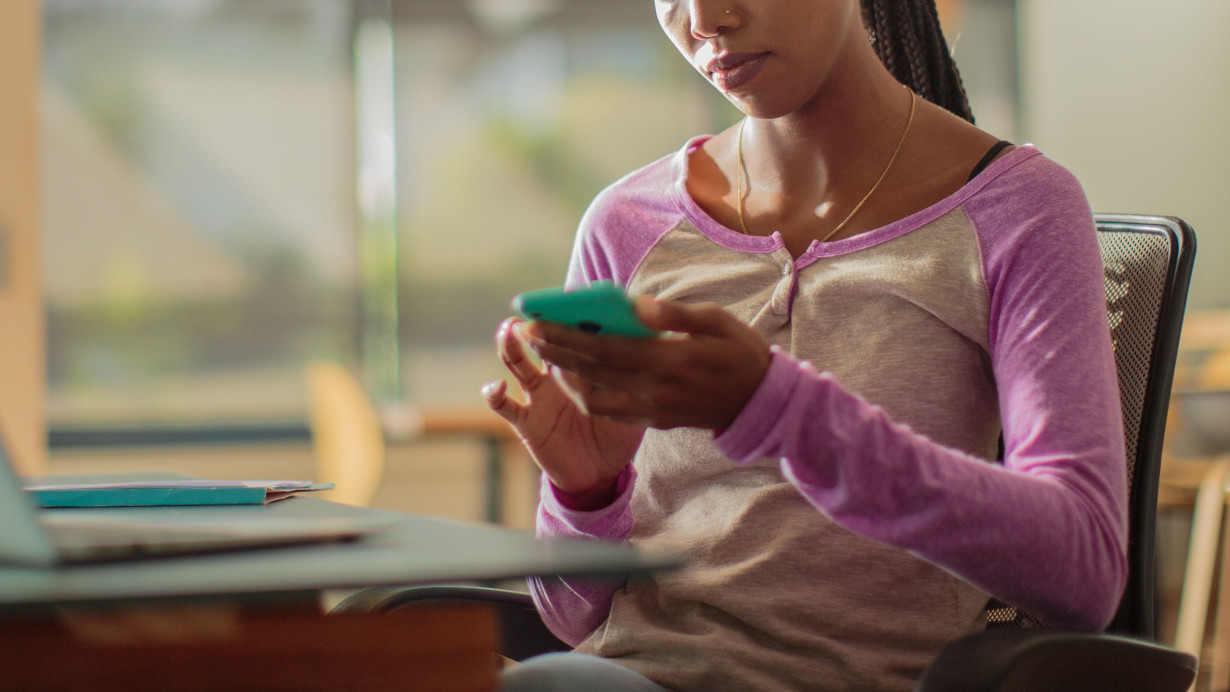(CNN) — It’s time to do your taxes, so you sit down at the computer to knock them out, but then you have to text your partner to get details about your mortgage interest.
That text turns into a quick check of your email, a few scrolls through social media, and then online shopping a sale at your favorite store –– before you know it, it has been an hour with no progress on your taxes. Sound familiar? To me, too.
Blame the technology, right? Not so fast. As easy as it may be to blame smartphones for time spent on distractions, people get distracted with or without them, according to a new study published Friday in the journal Frontiers in Computer Science.
“While users, unsurprisingly, engage more with the smartphone when it is easily accessible, the amount of time spent on work and non-work activities and the fragmentation of their workdays does not depend on the smartphone’s accessibility,” said study author Dr. Maxi Heitmayer, senior lecturer of psychology at the University of the Arts London and researcher and visiting fellow at the London School of Economics and Political Science.
To conduct his research, Heitmayer had a group of 22 people participate in two 5-hour computer-based work sessions: one with their smartphones nearby and the other with the phones outside their immediate reach.
People tended to use the phone much more when it was in reach — but when they couldn’t get to it, they used their computers to distract from their work, according to the research.
The study is small, so it’s difficult to draw big conclusions for the general population, said Dr. Noah Castelo, professor of consumer behavior at the University of Alberta. He was not involved in the research.
But the results suggest that just banning phones from classrooms or workplaces may not necessarily solve the problem of distraction, and focusing on your habits and behaviors around technologies may be the best first step to solving for better attention, Heitmayer said.
Distractions happen
Most of the people who Heitmayer talks to say they don’t like how they use their phone or how much time they spend on it, he said, and that makes sense. Smartphones are designed to keep you interested, even when you want to be doing something else, he noted.
“There is an open battle for your attention that is happening in your pocket,” he said. “I think these are the single best tools that we’ve invented. But also on there is the free software that harvests our attention.”
But phones aren’t always the only problem. The world is filled with distractions, and often we go looking for them, Heitmayer said.
“These disruptions, 89% of the time, it’s actually people themselves. It’s not the phone vibrating or lighting up or making a sound. It is you thinking, ‘Oh, I have missed something.’ And so, people check it,” he added, citing a study he conducted in 2021.
Not having your attention on one thing all the time makes sense for survival. Monitoring the group and being aware of social dynamics has been a helpful and normal thing for humans evolutionarily, Heitmayer said.
“We are not robots, and we are not going to be sitting down in front of the computer –– at least most of us –– and be narrowly focused for hours and hours and hours,” he said. “It seems that there is this appetite for distraction.”
Taking breaks and shifting your attention may be helpful for a more productive workday. But if you aren’t aware of how your smartphone may be capturing your attention once you pick it up, he said you may find yourself scrolling when you’d rather get up and take a walk.
Not having your phone within reach
If you do want to spend less time on your phone, the best measure to take may be keeping it out of reach, according to the new research.
When participants had their phone within reach, they spent almost twice as much time on it than when they had to get up and grab it.
“Out of reach means you have to lift your butt,” Heitmayer said. “If you can kind of stretch, somehow, that would still be within reach. And then people would still use their phones.”
After working with the phone out of reach, participants told Heitmayer there were more times they wanted to grab it, but that it was too far away.
The way that phones keep you hooked is different than an addiction, Heitmayer said: When you are addicted to a substance or to gambling, there tends to be a feeling that the longer you go without the thing you are addicted to, the more you need it.
“With the phone, it is the exact opposite,” Heitmayer said. When you have it more, you use it more; and the more you use it, the longer you stay on it. Conversely, when you don’t have it, you engage in something else –– like a walk outside or a conversation with a friend –– and find you have forgotten about it, he said.
How to address your phone habits
Using your phone in a healthy way can be complicated.
It’s not surprising that Dr. Paul Pavlou, dean of the Miami Herbert Business School at the University of Miami, found in his 2021 research that students with unlimited smartphone access had worse performance than when their phones were banned in the classroom. But the participating students did significantly better when they were instructed to use their phones to help with their learning.
“Technology will be there, and I think we’re better off leveraging it as best as we can,” Pavlou, who was not involved in the new study, said.
That take is Heitmayer’s viewpoint as well.
“We have this device-centered narrative: ‘We are addicted to the phone, and the phone is the problem, and therefore someone else should take care of it for me,’” Heitmayer said. “It’s much harder, of course, to accept, ‘OK, actually, it’s my habits with this (device) that’s a problem.’”
Limiting your screen time can be helpful in getting you to spend your leisure time in the way you really want to, Castelo said.
His February study found that blocking internet from people’s phones caused them to spend more time doing things like exercising, socializing in person, pursuing hobbies and reading books.
For better phone use, it’s important to become more literate about how your attention is being captured, Heitmayer said. For students, there is digital literacy education on predators online, scams to get their information, and spotting misinformation, but not much on learning to recognize when an app is designed to keep you engaged beyond your own interest, he added.
What to say to your teens
Jenny Anderson, journalist and coauthor of “The Disengaged Teen: Helping Kids Learn Better, Feel Better, and Live Better,” recommends checking in with teens about things like whether they remember what content they engaged with on their social media platforms was about, if they could track how long they were on, and if they noticed a point at which they were depleted rather than replenished by the scrolling.
It is also essential to recognize that a societal pressure to be productive and avoid idleness can drive unwanted phone use, Heitmayer said.
“We’ve all developed this absolute horror, almost, of being idle,” he said. “In public, when you stand there, everyone’s uncomfortable … when you’re on the phone, then it looks like you’re doing something.”
There may not be an easy fix when it comes to limiting phone use and distractions, but simple steps such as knowing the social forces that push you to reach for your device and keeping your phone out of reach when you don’t want to be using it can help, Heitmayer said.
The-CNN-Wire
™ & © 2025 Cable News Network, Inc., a Warner Bros. Discovery Company. All rights reserved.

 Trump has begun another trade war. Here's a timeline of how we got here
Trump has begun another trade war. Here's a timeline of how we got here
 Canada's leader laments lost friendship with US in town that sheltered stranded Americans after 9/11
Canada's leader laments lost friendship with US in town that sheltered stranded Americans after 9/11
 Chinese EV giant BYD's fourth-quarter profit leaps 73%
Chinese EV giant BYD's fourth-quarter profit leaps 73%
 You're an American in another land? Prepare to talk about the why and how of Trump 2.0
You're an American in another land? Prepare to talk about the why and how of Trump 2.0
 Chalk talk: Star power, top teams and No. 5 seeds headline the women's March Madness Sweet 16
Chalk talk: Star power, top teams and No. 5 seeds headline the women's March Madness Sweet 16
 Purdue returns to Sweet 16 with 76-62 win over McNeese in March Madness
Purdue returns to Sweet 16 with 76-62 win over McNeese in March Madness








